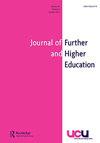Young adult caregivers in higher education: a study of prevalence in France
IF 2.4
Q1 EDUCATION & EDUCATIONAL RESEARCH
引用次数: 0
Abstract
ABSTRACT Young adult caregivers are people aged 18–25 years who care for a relative with an illness/disability. They are an understudied population. In France, there are currently no data and no public services specifically targeting them while literature showed that caregiving has consequences on academic development. As the pursuit of higher education is a societal expectation, the aim of this study was to examine the prevalence, characteristics, and mental health of young adult caregiver students in France to promote policy and practice development. Between February 2019 and April 2021, 6767 students (77.28% women; Mage = 20.14, SDage=1.87) answered a self-report questionnaire assessing sociodemographic-academic characteristics, relative’s illness/disability, caregiving activities, perceived support, and mental health. Results showed that 63.17% of participants were confronted with the illness/disability of a relative, and 15.86% provided a high level of support and could thus be classified as young adult caregivers. They were generally females from low-income families who experienced financial hardship, and they mostly cared for a mother or grandparent with a physical or mental illness. Regarding academic characteristics, they were mostly enrolled on a care-related course, in some cases via a distance learning program. They reported current and previous academic difficulties. They reported poorer mental health than noncaregivers. The identification procedure based on the extent of caregiving activities should be tailored to the characteristics of emerging adults. Considering the high prevalence of young adult caregivers in France, there is an urgent need to enhance awareness to better identify and support those in higher education.高等教育中的年轻人照顾者:法国的流行研究
摘要:年轻的成人护理人员是指年龄在18-25岁之间,照顾有疾病/残疾的亲属的人。他们是一个研究不足的群体。在法国,目前没有专门针对他们的数据,也没有公共服务,而文献表明,照顾对学术发展有影响。由于追求高等教育是一种社会期望,本研究的目的是调查法国年轻成人护理学生的患病率、特征和心理健康,以促进政策和实践的发展。在2019年2月至2021年4月期间,6767名学生(77.28%为女性;Mage=20.14,SDage=1.87)回答了一份自我报告问卷,评估了社会人口学学术特征、亲属的疾病/残疾、护理活动、感知支持和心理健康。结果显示,63.17%的参与者面临亲属的疾病/残疾,15.86%的参与者提供了高水平的支持,因此可以归类为年轻成人护理人员。她们通常是来自经济困难的低收入家庭的女性,她们大多照顾患有身体或精神疾病的母亲或祖父母。关于学术特征,他们大多参加了与护理相关的课程,在某些情况下通过远程学习计划。他们报告了当前和以前的学术困难。据报道,他们的心理健康状况比未接种疫苗的人差。基于护理活动范围的识别程序应适合新兴成年人的特点。考虑到法国年轻成人护理人员的比例很高,迫切需要提高认识,更好地识别和支持那些接受高等教育的人。
本文章由计算机程序翻译,如有差异,请以英文原文为准。
求助全文
约1分钟内获得全文
求助全文
来源期刊

JOURNAL OF FURTHER AND HIGHER EDUCATION
EDUCATION & EDUCATIONAL RESEARCH-
CiteScore
5.20
自引率
4.30%
发文量
80
期刊介绍:
Journal of Further and Higher Education is an international, peer-reviewed journal publishing scholarly work that represents the whole field of post-16 education and training. The journal engages with a diverse range of topics within the field including management and administration, teacher education and training, curriculum, staff and institutional development, and teaching and learning strategies and processes. Through encouraging engagement with and around policy, contemporary pedagogic issues and professional concerns within different educational systems around the globe, Journal of Further and Higher Education is committed to promoting excellence by providing a forum for scholarly debate and evaluation. Articles that are accepted for publication probe and offer original insights in an accessible, succinct style, and debate and critique practice, research, theory. They offer informed perspectives on contextual and professional matters and critically examine the relationship between theory and practice across the spectrum of further and higher education.
 求助内容:
求助内容: 应助结果提醒方式:
应助结果提醒方式:


